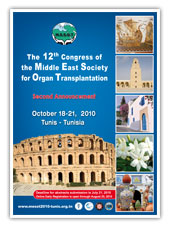Key dates
- Call for abstracts opens on january 15, 2010.
- Deadline for abstracts submission is june 30, 2010.
Practical informations
Weather, Time :
- Time : Standard Zone : GMT/UTC + 01:00 hour
www.timeanddate.com/worldclock/city.html?n=253 - Weather : www.meteo.tn
Tunisia has a typical Mediterranean climate, with hot summers and mild winters, when there is the most rainfall. Best periods are spring and autumn.
Currency, Banking :
- Currency :
The Tunisian Dinar (TND) is the basic unit which is subdivided into 1000 millimes.
It appears in paper notes of 5, 10, 20 and , 30 and 50 TND denominations.
Coins are in denominations of 5 TND, 1 TND, 0.5 TND (500 millimes), 0.1 TND (100 millimes)
Coins of 1, 2, 5, 10, 20 and 50 millimes are also available. - Exchange :
Currency exchange facilities are available in most banks, hotels and airports and operate normal business hours. The most convenient currencies are Euros or US Dollars.
• Currency Exchange Rates: www.xe.com/ucc/
• Credit Cards: The most widely accepted credit cards are Visa, Euro card and American Express.
Electricity :
Electrical current is 220V, 50 Hz. Electric plugs have two round pins (as in continental Europe).
Communications :
- Telephone : Country code is 216. Automatic dialling extends to almost every part of the country and covers direct international calls.
- Mobile Telephone : Roaming agreements with international mobile phone companies exist. You can buy a local SIM card at “Tunisie Telecom” offices if you provide appropriate identification.
There are two other mobile operators working in Tunisia. - Internet : E-mail can be accessed from Internet cafes in most towns and all resorts. Free internet Wifi access is available in hotel halls including the Congress Venue.
Gastronomy :
Tunisian food combines Arabic, Mediterranean, Middle Eastern and French influences.
Dishes are cooked with olive oil, spiced with aniseed, coriander, cumin, caraway, cinnamon or saffron and flavoured with mint, orange blossom or rose water; many are accompanied by harissa, a chili and garlic condiment.
Fresh fish and seafood are often splendid, as are roast chicken and baked lamb dishes.
Shopping :
Special purchases include copper and brassware (engraved trays, ashtrays and other utensils), articles sculpted in olive wood, leather goods (wallets, purses, handbags), clothing (kaftans, jelabas), perfume oils, vibrantly painted pottery and ceramics, silver and enamelled jewellery.
Rugs and carpets are a good buy. The two major types are woven (non-pile) and knotted (pile). Look out for traditional Berber pieces. The quality of all carpets is strictly controlled by the National Handicrafts Office, and a label attached to the carpet shows its quality seal and grading.
The medina of Tunisia’s larger towns, are great places to buy Tunisian crafts, with an amazing range, but you will have to haggle.
If you prefer not to enter the fray, there are Société de Commercialisation des Produits de l’Artisanat (SOCOPA; website: www.socopa.com.tn) workshops and stores throughout the country where visitors can buy items at fixed prices.
Tipping :
Tipping is not a requirement; It is your choice as a reward for good service. Waiters and taxi drivers are usually tipped a few coins; waiters in tourist restaurants are accustomed to 5-10%.





